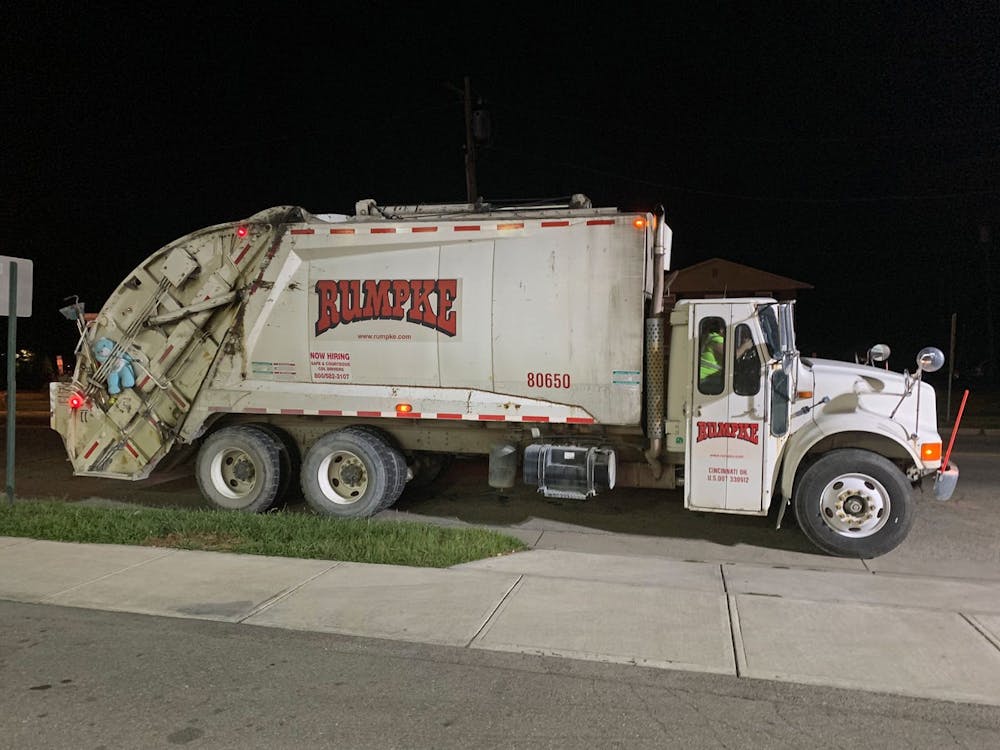With new students potentially moving in over the next few weeks, it’s uncertain whether Oxford is ready for them or not. But Rumpke is prepared for all of it.
Rumpke Waste and Recycling manages the waste of Southwest Ohio, maintaining one of the largest landfills in the country. When COVID-19 began to proliferate across the United States, it had to adjust accordingly.
Driver and trash collector Jody Kieffer has gone to work at four in the morning and picked up the waste from both Miami students and Oxford residents for the past 20 years. In a normal year, most of the trash in Oxford comes from the various businesses lining the streets of uptown. This year is different.
“The bars are really hurting, the businesses are really hurting,” said Kieffer. “We’re four to six tons shy of what we normally have.”
This decrease in trash outflow is a trend that began when the stay-at-home orders and state mandates swept across Ohio and forced restaurants to close their doors and open their online delivery services.
With these orders, there came an increase in residential trash, although not enough to offset the loss in volume from the businesses.
“As far as residential, we’re getting more garbage because people are home and are working from home,” Kieffer said.
The increase in residential trash spiked in May, when the students that had to leave campus returned to complete the process of moving out.
David Treleaven is an environmental specialist working for the city of Oxford. His plethora of duties includes managing a food scrap program that collects food to be processed at an industrial composter at the Allen County Jail in Lima, Ohio, authorizing bow hunting and controlling Oxford’s deer population and working with Rumpke to manage the waste and recycling in Oxford.
Usually, Rumpke gets help during student move-outs in May through Sharefest, a program where student furniture and materials are collected to redistribute to people that could use them.
“This year, with COVID-19, it didn’t happen,” he said. “Students and families all came back and moved out all at once. On Friday, there wasn’t anything in town, but by Monday, it was a wreck.”
Kieffer had a similar opinion.
Enjoy what you're reading?
Signup for our newsletter
“I came in Monday morning, and it looked like a bomb went off,” he said. “Not having Sharefest really got us hard.”
This problem was exacerbated by a variety of other factors, as well.
“In 2019, Rumpke had 229 hours of labor for the move-out. In 2020, they only had 145 hours,” said Treleaven. “Another issue Rumpke had was that their collection crews had had so much overtime in the months prior to the move-out collections, some of them were burned out on long hours.”
Fortunately, Rumpke is now ready for any move-in that may happen this fall. Corporate Communications Manager Molly Yeager Broadwater detailed the changes that have been made to keep workers safe while collecting trash.
“There’s a lot of thought that has to go into it,” she said.
Rumpke’s new policies include providing masks to drivers if they have to interact with other people while collecting, running meetings virtually, asking for residents to bag all of their trash, and constantly sanitizing their facilities — from the time clock machine to the trucks themselves.
“Basically, we’re sanitizing the whole cabin when we get done just to make sure that we’re not taking [the virus] to our loved ones or anything,” Kieffer said.
These policies seem to have been working.
“We’ve had some cases among our 3,200 employees, and none have been traced back to the work,” Yeager Broadwater explained.
As for a potential influx of students — and trash — coming to campus this fall, there isn’t much concern. Treleaven said the reduced hours and budget for May gave the city extra funds for collection this fall, making things easier than normal.
Given Miami’s current situation, it’s hard to say what campus will look like in the near future, but whatever happens, the trash will be collected.
moorese6@miamioh.edu




